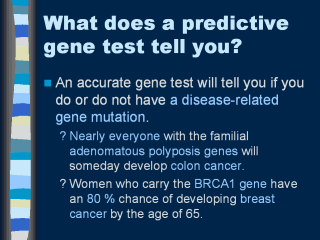 |
An accurate gene test will tell you if you do or do not have a disease-related
gene mutation. If you do, a variety of factors can influence the gene's
penetrance and the chances that you will actually develop disease. Nearly
everyone with the familial adenomatous polyposis genes will - unless he or she
takes effective preventive measures - someday develop colon cancer. On the other
hand, women who carry the BRCA1 breast cancer susceptibility gene have an
80-percent chance of developing breast cancer by the age of 65; their risk is
high but not absolute.
Of course, even family members who escape the inherited susceptibility gene are
not exempt from risk. Like anyone else, they could develop mutations in that
same gene during their lifetimes. Or, they could have inherited a different,
unknown susceptibility gene. |
